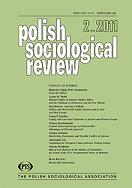Central Actors and Groups in Political Elite: Advantages of Network Approach
Central Actors and Groups in Political Elite: Advantages of Network Approach
Author(s): Tetiana KostiuchenkoSubject(s): Social Sciences
Published by: Polskie Towarzystwo Socjologiczne
Keywords: political elites; affiliation networks; central actors; post-Soviet countries; Ukraine.
Summary/Abstract: Studies conducted inCEEstates by a number of social and political scientists within the elite theory paradigm focus mainly on issues concerning elite circulation and recruitment, struggles between governing and non-governing (contra-) elites. Although, it is still an open question what relational structures, or networks, exist within power elites. This issue becomes even more important when 'interest groups' become the basis for creation of internally circulating 'ruling class' whose members periodically seize key positions in different institutions and collectively capture the decision-making process at the state level. In order to define how elite members co-operate, to identify central individuals and key decisionmakers, one needs to understand the structure of political elite network. This paper contains an attempt to explore political elite networks formation and functioning in Ukraine 20 years after the regime change. Main research questions are: what ties and to what extent are important for political elite members; what clusters exist within Ukrainian political elite network; to what extent the concepts of social capital and interpersonal trust can be employed to explain the formation of joint legislative initiatives. In addition, model of elite network functioning allows the depiction and verification of the role of central players taking into account their relational patterns. Sample included members of the Parliament,Government, and the Presidential Secretariat (almost 500 biographies). Biographical method and in-depth interviews were applied for collecting both quantitative and qualitative network data. Specific software enabled applying various SNA tools and procedures for hypotheses testing and network modeling.
Journal: Polish Sociological Review
- Issue Year: 174/2011
- Issue No: 2
- Page Range: 195-204
- Page Count: 10
- Language: English

